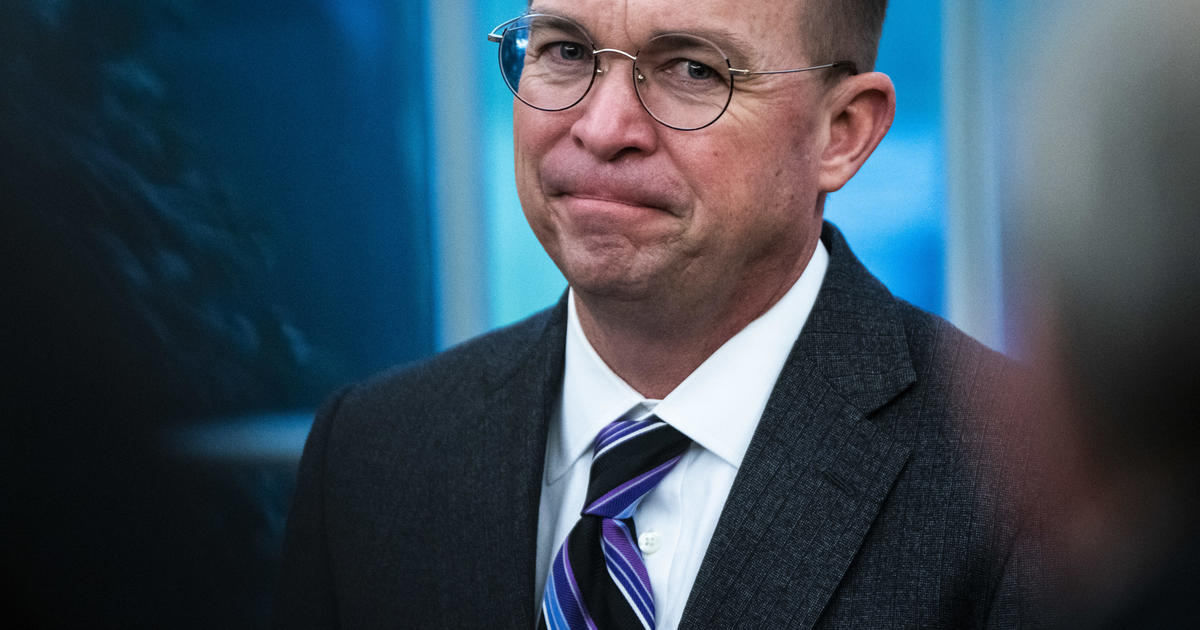Former acting White House chief of staff Mick Mulvaney sat for an interview with the House Jan. 6 committee for two and a half hours on Thursday, answering questions about communication with the White House on that day when he knew the president had lost the election, he told CBS News.
Mulvaney, who is currently a CBS News contributor, also discussed his decision after Jan. 6 to resign his post as special envoy to Northern Ireland, he said.
Mulvaney served as the director of the Office of Management and Budget in the Trump administration and was tapped to serve as acting chief of staff in Jan. 2019, a role he held until he was replaced with Mark Meadows in March 2020.
Mulvaney told the committee that he concluded Trump had lost the election about a week after it was over when he had a phone conversation with former Trump campaign manager Bill Stepien and deputy campaign manager Justin Clark.
FILE: WASHINGTON, DC – JANUARY 7 : Acting White House Chief of Staff Mick Mulvaney listens as President Donald J. Trump and First Lady Melania Trump meet with Prime Minister of Greece Kyriakos Mitsotakis and wife Mareva Grabowski in the Oval Office at the White House on Tuesday, Jan 07, 2020 in Washington, DC.
Jabin Botsford/The Washington Post via Getty Images
“They said they were gonna give us all this evidence about how we were going to win and they had nothing and that’s sort of that’s when I decided it was over,” he said. He described himself as “checked out” after November.
The committee also asked about his experience getting information to Trump when he served as the acting chief of staff. Mulvaney described what he called the “chorus approach,” or getting four or five people from different places to try to get the president information on a particular topic. For him, that group usually included Fox News commentator Sean Hannity, House Minority Leader Kevin McCarthy, and family members Donald Trump Jr., Ivanka Trump, and Jared Kushner. Sometimes the list included New England Patriots owner Bob Kraft, Trump’s business associates or Cabinet members.
Mulvaney said he questioned who was talking to the president on Jan. 6, when most of the close circle of advisers were calling on the president to make a statement as the mob descended on the Capitol.
Mulvaney himself said he had little contact with the White House that day. He called and got no response, so he texted Meadows saying, “Mark: he needs to stop this, now. Can I do anything to help?”
He eventually tweeted, “The best thing @realdonaldtrump could do right now is to address the nation from the Oval Office and condemn the riots. A peaceful transition of power is essential to the country and needs to take place on 1/20.”
He said committee vice chair Liz Cheney, who participated in part of the interview along with committee member Elaine Luria, was interested in Hannity’s role in advising the president.
“I said, look, I always considered him to be sort of an informal adviser to the president,” Mulvaney said. “The president a lot of those. You had business associates, you had media types, you had family members.”
Mulvaney called the questions from the committee “fair and professional” but “one-sided.”
“There was nobody there asking me questions that might make the president look good,” he said. “They weren’t leading me down the way to say bad things about the president, but it was only obviously one half of the questions you would get at say, a deposition.”
The House Jan. 6 committee recently wrapped a series of public hearings this summer, and indicated there could be more in the fall. The last hearing focused on what Trump was doing for 187 minutes between when his supporters descended on the Capitol and his first statement telling the rioters to go home.
Earlier hearings focused on the mobilization of the mob at the Capitol and a scheme by Trump’s allies to put forward fake electors supporting him in several battleground states that President Joe Biden. The hearings also focused on Trump’s pressure campaigns on former Vice President Mike Pence, the Justice Department, state lawmakers and local elections officials to change the outcome of the election.
Rebecca Kaplan covers Congress for CBS News.
